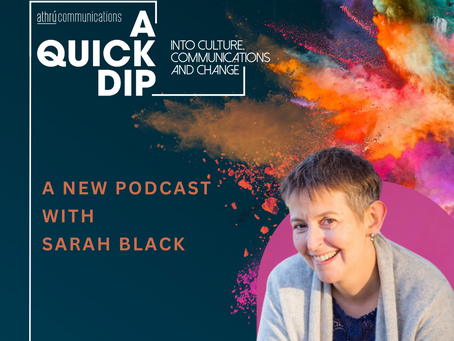I started a podcast: a thing that I thought and possibly said that I would never do.
A podcast.
It was inspired by wanting to talk about three things that matter most to me in the work that I do and by some of the fascinating people I get to do it with.
A Quick Dip is a series of short conversations with colleagues from all over the world, from all sorts of backgrounds. All with interesting perspectives and ideas to share.

The content has been driven by my interest in three things: culture, communications and change.
For me, these three concepts are interconnected and are fundamental to how organizations operate internally and show up externally.
Here’s why I’m so passionate about each of them.
Culture
I often think that culture is what happens in organizations when leadership isn’t paying attention. Not paying attention to it doesn’t mean it doesn’t exist. There’s a plethora of definitions but I like the simplest one which is just how things get done around your organization. Building a healthy, inclusive culture takes effort and work. I’m endlessly fascinated by how organizations function – making sense of your culture is interconnected with how you adapt to change and how easy (or not) it will be to introduce change when it’s needed.
Of course, your organization’s internal culture isn’t the only culture that matters. It’s hard to think of a place in the world right now where you would not be working across different types of cultures, from national to regional to cultures that grow around specific identities. For example, having lived in the USA for more than seven years, I’d argue that Texas and New York are quite different culturally. The county I lived and worked in was one of the most ethnically diverse in the US at the time. You could hear multiple languages on a trip to the local grocery store and that brought even more cultural differences to workplaces and communities.
Being aware of and making sense of our cultural differences can be vitally important to how your people thrive at work and to your team’s productivity. Think of the time lost to misunderstanding, misapprehension and the failure to turn each other’s differences into innovation and opportunity for growth. And of course, there’s an issue with exporting your domestic organizational culture to new places. Does the way you do things in the UK work in India? Or vice versa?
Understanding our cultural differences is only part of the puzzle though. We need to understand our similarities too. And we need to be curious enough to understand that cultural identity, experience, individual identity and personality all intersect to make each of us unique.
Communication:
Communication builds organizational culture. Communication is central to change management. It’s not the only thing but it’s a big thing.
Here’s the biggest thing I see going wrong with how organizations approach communications – lack of alignment. There might be great work being done by internal communications professionals but poor interpersonal communication by leaders and people managers. There might be amazing individual leaders and people managers but very poor organization-wide internal communications. And then, there may be a huge disconnect between your people’s experience of your organization day to day and what your organization is saying externally.
The need for alignment and consistency is critical. It starts with understanding your values, the importance of communications and then sheer work and commitment. It also takes time to ask at an individual, team and organizational level what effective communication looks like.
My favourite question to ask leaders about their communication activity is a simple one but it can be a game changer. Why? Why is this being done? Why is this being said?
And the other thing that is so often forgotten in communication is listening. Listening is at least 50% of communication and is often overlooked.
Change:
To paraphrase a Melissa Etheridge lyric, the only thing that stays the same is change. It’s a constant in most organizations. Sometimes it’s a gentle evolution and sometimes, it’s a total transformation.
No matter the scale, change is hard. Often it needs to happen at the individual, the team and the organizational level. How difficult we find change at each level is closely related to both culture and communication.
Each of my guests has skills, expertise and experience in issues that touch on at least one aspect of culture, communications or change.
All of them are changemakers in their own way.
I can’t wait to share more of our conversations with you. The first season’s episode are all available now. You can listen here and wherever you get your podcasts.


